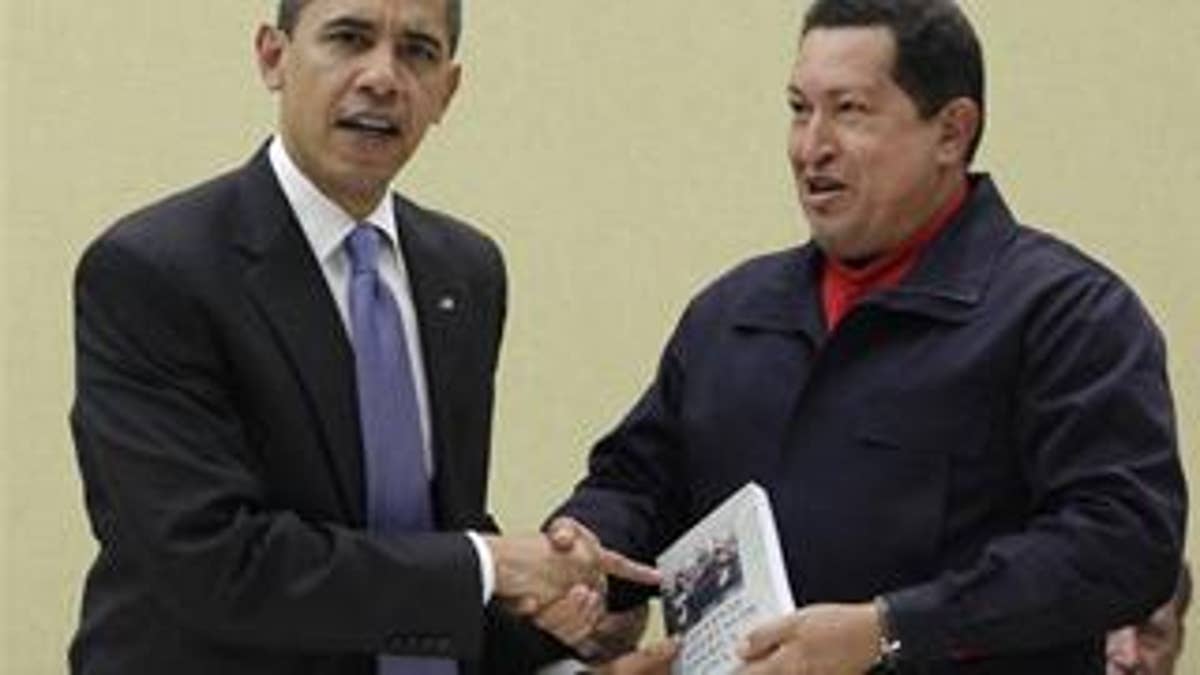
PORT-OF-SPAIN, Trinidad and Tobago - If a picture is worth a thousand words, then many observers are wondering what's the political significance of photos capturing President Obama and Venezuelan strongman Hugo Chavez exchanging friendly greetings and gestures at a regional summit.
Although Venezuela provides about 10 percent of the U.S. oil imports, the OPEC nation was locked in a bitter war of words with the Bush administration -- Chavez famously called Bush "the devil" at a meeting of the United Nations.
But Chavez seemed to warm to Obama this weekend at the Summit of the Americas, shaking Obama's hand on Friday and apparently trying Saturday to recruit Obama into his book club. In front of photographers, Chavez gave Obama a copy of "The Open Veins of Latin America: Five Centuries of the Pillage of a Continent," a book by Eduardo Galeano, which chronicles U.S. and European economic and political interference in the region.
But the White House is downplaying the significance of the encounters, saying Chavez is something of a publicity hound and is trying to leverage his two chance encounters.
"Well, I think the Venezuelan leader is always one to make a splash. That's what he does and he does it pretty well," said Amb. Jeffrey Davidow. "He's captured the interest of the press. I think the fact that our president shook his hand and smiled doesn't constitute a new relationship."
The book exchange, coming on the first full day of meetings at Summit of the Americas on the two-island nation of Trinidad and Tobago, followed a brief grip-and-grin encounter the previous evening, when Obama greeted Chavez in Spanish. Obama exchanged handshakes and pats on the back with Chavez, who once likened President George W. Bush to the devil.
"I think it was a good moment," Chavez said about their initial encounter. "I think President Obama is an intelligent man, compared to the previous U.S. president."
When a reporter asked Obama what he thought of the book Chavez gave him, the president replied: "I thought it was one of Chavez' books. I was going to give him one of mine."
Obama was taking part in a series of plenary sessions, group gatherings and one-on-one meetings that the White House hoped to squeeze into a busy schedule. He hoped to make time for individual sessions with leaders from Canada, Colombia, Peru, Haiti and Chile, aides reported.
Obama was noncommittal about a possible meeting with Chavez, who criticized past U.S. policy at the summit, but expressed hope that relations between the nations would change.
"I think we're making progress at the summit," was all Obama would say.
At his first meeting with South American leaders, Obama waited several minutes while security officers and members of the media pushed noisily into the room. Somebody accidentally hit a light switch, prompting Obama to ask: "Who turned off the lights, guys?"
He said he hoped events would go more smoothly during the meeting where he said he would talk to the leaders about energy, security and other topics. "I have a lot to learn and I'm very much looking forward to listening," the president said.
In an opening speech to the 34-nation gathering on Friday, the president promised a new agenda for the Americas, as well as a new style.
"We have at times been disengaged, and at times we sought to dictate our terms," Obama said to loud applause. "But I pledge to you that we seek an equal partnership. There is no senior partner and junior partner in our relations."
He also extended a hand to a leader Ronald Reagan spent years trying to drive from power: Nicaragua's Daniel Ortega. The Sandinista president stepped up and introduced himself, U.S. officials reported.
Yet soon after, Ortega, who was ousted in 1990 elections that ended Nicaragua's civil war but who was returned to power by voters in 2006, delivered a blistering 50-minute speech that denounced capitalism and U.S. imperialism as the root of much hemispheric mischief. The address even recalled the 1961 Bay of Pigs invasion of Cuba, though Ortega said the new U.S. president could not be held to account for that.
"I'm grateful that President Ortega did not blame me for things that happened when I was three months old," Obama said, to laughter and applause from the other leaders.
But perhaps the biggest applause line was his call for a fresh start in relations between Washington and Havana.
"I know there's a longer journey that must be traveled to overcome decades of mistrust, but there are critical steps we can take toward a new day," he said.
In January, Chavez said Obama had the same "stench" as former President Bush after Obama criticized Chavez for backing the FARC (Armed Revolutionary Forces of Columbia) guerillas in neighboring Columbia. Earlier this month during a trip to Iran, Chavez said he doubted relations would improve with the U.S. because Obama was still "president of an empire."
"I hope President Obama is the last president of the Yankee Empire, and the first president of a truly democratic republic, the United States," Chavez said, after declaring a visit to Tehran "is like arriving at one's own home."
And Chavez has threatened to veto a declaration on economic, security and environmental policies negotiated by the 34 nations attending the summit. The declaration is merely a statement of principles and has no enforcement mechanisms so the Venezuelan veto is essentially meaningless. Still, it caught U.S. officials by surprise since Chavez's government had been party to months of talks leading up to the declaration's drafting.
Ortega, a frequent echo chamber for Chavez's pronouncements, announced here late Friday that Nicaragua would also veto the declaration.
FOX News' Major Garrett and The Associated Press contributed to this report.












































